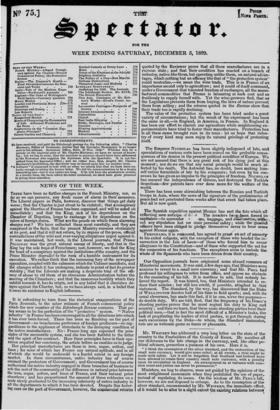NEWS OF THE WEEK.
THERE have been no farther changes in the French Ministry, nor, so far as we can perceive, any fresh cause of alarm in their measures. The Liberal papers in Paris, however, discover that things get daily worse; that the Charter is just about to be violated; that a conspiracy against the liberties of France has been organized, and will be acted on immediately; and that the King, sick of his dependence on the Chamber of Deputies, longs to exchange it for dependence on the rulers of foreign states. What are the proofs on which these alarming charges rest? We have collected these most 'carefully, and they are comprised in the facts, that the pn,sent Ministry remains obstinately at its post, and that it will not return, by its organs of the press, official contradictions of the wild and ever-varying allegations urged against it. It was maintained, last week, in the Liberal journals, that Prince POLIGNAC was the great natural enemy of liberty, and that in the King lay the sole hope of Frenchmen; now, however, we find the King the head of a conspiracy against the institutions of the country, and the Prime Minister degraded to the rank of a humble instrument for its execution. We rather think that the increasing fury of the newspaper opposition, coupled with the calmness which the Cabinet manifests, and the changes which it has undergone, indicate in point of fact its greater stability ; that the Liberals are making a desperate trial of the effi- cacy of abuse to rid them of an obnoxious Administration before the meeting of the Chambers ; and that the rancorous hostility which they exhibit towards it, has its origin, not in any belief that it cherishes de- signs against the Charter, but, as we have always said, in a belief that it owes its existence to English influence.
It is' refreshing to turn from the rhetorical exaggerations of the Paris Journals, to the sober estimate of French commercial policy which the new number of the Edinburgh Review contains. That po- licy seems to be the perfection of the " protective " system. "Native industry" in France has been encouraged in all the directions into which it has ever been forced. There has been no flinching on the part of Government—no treacherous preference of foreign producers—no nig- gardliness in the appliance of stimulants to the drooping condition of the native manufacturer. No: France long ago espoused the piin- ciples of the mercantile system, and she has been faithful to the letter and the spirit of her contract. How these principles have in their ope- ration requited her constancy, the article before us enables us to judge. Her principal manufactures are those in iron, sugar, cotton, and linen ; for none of which has France any natural aptitude, and in all of which she would be undersold to a fearful extent in any foreign market. In these circumstances, native industry has of course claimed the protection of Government; and Government has of course authorized the native industry engaged in these branches of business to rob the rest of the community of the difference in natural price between the iron, sugar, cotton, and linen of France, and their natural price elsewhere; and has proportioned the amount of these robberies on a scale nicely graduated to the increasing inferiority of native industry in all the departments to which it has been devoted. Despite this foster- ing care on the part of Government, however, the commercial returns quoted by the Reviewer prove that all these manufactures are in a ruinous state ; and that their condition has reacted on a branch of industry, native like them, but operating unlike them, on natural advan- tages, which nothing but an efficacy like that of "the protective system" could neutralize,—we mean the wine trade. This is in France of an importance second only to agriculture ; and it could of itself command, under a Government that tolerated freedom of exchanges, all the manu- factured commodities that France is labouring at such cost and so fruitlessly to supply herself with. Yet the wine-growers find, that as the Legislature prevents them from buying, the laws of nature prevent them from selling; and the returns quoted in the Review show that their trade too is rapidly declining.
The value of the protective system has been tried under a great variety of circumstances ; but the result of the experiment has been the same in all,—in England, in America, in France. In England it has been our effort to cherish our agriculture while neighbouring ex- perimentalists have tried to foster their manufactures. Protection has in all these cases brought ruin in its train : let us hope that indus- try of every kind may soon enjoy its natural privilege of protecting itself.


















